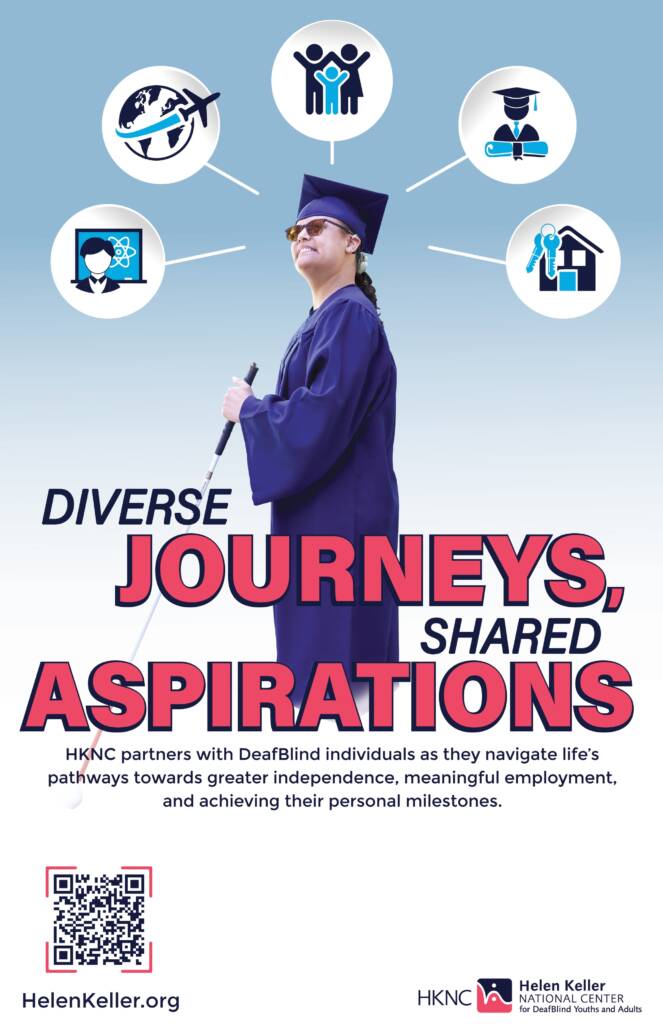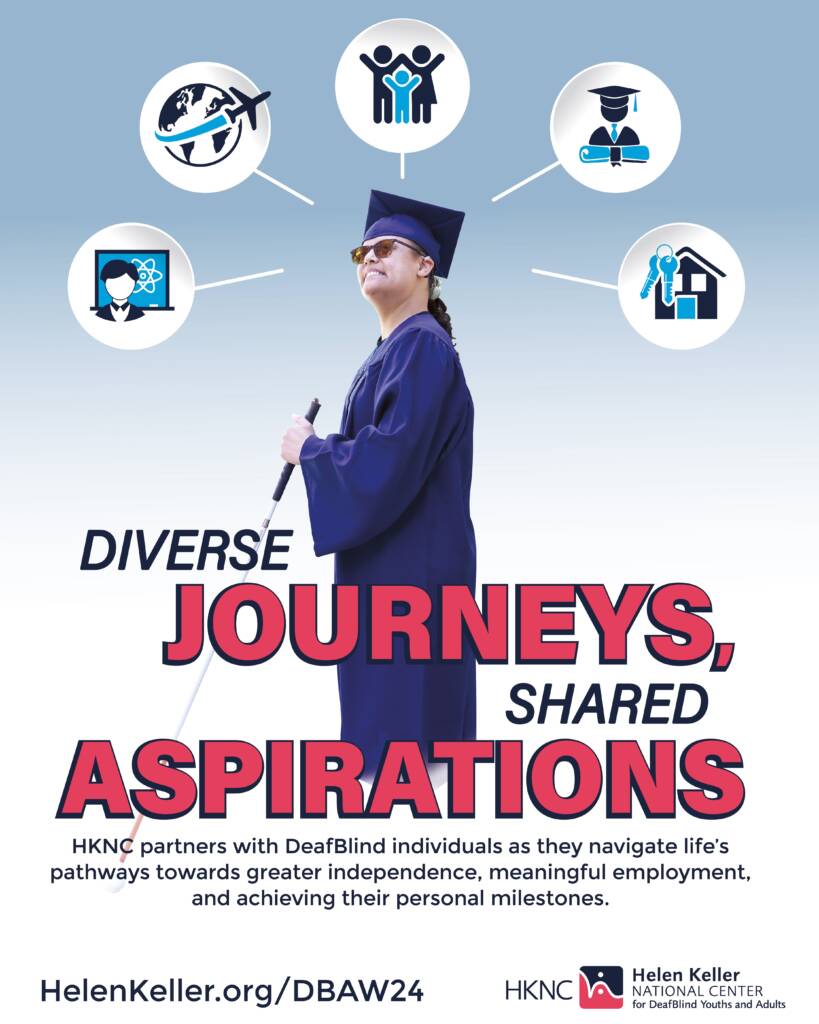What is DeafBlind Awareness Week?
In recognition of the achievements of people who are DeafBlind, the Helen Keller National Center for DeafBlind Youths & Adults (HKNC) celebrates the last week in June as “DeafBlind Awareness Week.”
This year marks the 40th anniversary of this national advocacy campaign which has been held each year since 1984 when then-President Ronald Reagan issued a proclamation in recognition of this special week. The purpose of DeafBlind Awareness Week is to raise public awareness about individuals who have combined hearing and vision loss.
In 2024, we will celebrate Helen Keller DeafBlind Awareness Week from June 23rd to June 30th. This year’s campaign focuses on the diverse journeys and shared aspirations of DeafBlind individuals and how HKNC partners with them as they navigate life’s pathways towards greater independence, meaningful employment, and achieving their personal milestones. Through personalized support and specialized training, HKNC equips DeafBlind individuals with the skills and confidence needed to overcome barriers and embrace opportunities.
Our 2024 poster features a former HKNC participant, Kahlyn, portraying a young graduate embracing her opportunities as she looks to the future. It underscores that while our journeys may differ, our aspirations unite us.

Poster Description
A DeafBlind Awareness Week poster showing a woman in a blue graduation cap and gown smiling into the distance, holding a white cane, and wearing sunglasses. Above her are 5 illustrated icons representing themes such as becoming a teacher, traveling, starting a family, higher education, and owning a home. Underneath the woman there are big words that say “Diverse Journeys, Shared Aspirations.” In smaller letters beneath that are words that say “HKNC partners with DeafBlind individuals as they navigate life’s pathways towards greater independence, meaningful employment, and achieving their personal milestones.” On the bottom left of the poster is a QR code that goes to helenkeller.org. On the bottom right of the poster is the Helen Keller National Center for DeafBlind Youths and Adults logo.
Audio of Poster Description
Join Us in Celebrating DeafBlind Awareness Week
1. Learn about the DeafBlind community
Being DeafBlind refers to an individual who has combined hearing and vison loss. At Helen Keller National Center (HKNC), we believe that education is essential to understanding the challenges and celebrating the accomplishments of DeafBlind individuals.
Explore Our Resources
Explore HKNC’s many free resources, including DeafBlind Culture and Guidelines for Respectful Interactions with DeafBlind Individuals in our online Resource Center. Understanding the unique experiences and cultural nuances of DeafBlind individuals is crucial for fostering inclusive environments. Learning how to approach, communicate, and interact with DeafBlind individuals ensures that these interactions are respectful and conducive to full and equal participation. These resources as well as other courses can be found in our Learning Center.
HKNC is the only national agency that provides information, referrals, support, and a Comprehensive Vocational and Rehabilitation Program to DeafBlind youths and adults who have a combined hearing and vision loss. HKNC also provides support to the families and professionals who work with them.
2. Raise awareness online

During DeafBlind Awareness Week, we encourage you to raise public awareness about individuals who are DeafBlind by downloading and sharing our campaign graphic on social media. Use the hashtag #DBAW24, and tag @helenkellerservices.
Campaign Graphic Image Description
A DeafBlind Awareness Week poster showing a woman in a blue graduation cap and gown smiling into the distance, holding a white cane, and wearing sunglasses. Above her are 5 illustrated icons representing themes such as becoming a teacher, traveling, starting a family, higher education, and owning a home. Underneath the woman there are big words that say “Diverse Journeys, Shared Aspirations.” In smaller letters beneath that are words that say “HKNC partners with DeafBlind individuals as they navigate life’s pathways towards greater independence, meaningful employment, and achieving their personal milestones.” On the bottom left of the poster is a link to HelenKeller.org/DBAW24. On the bottom right of the poster is the Helen Keller National Center for DeafBlind Youths and Adults logo.
3. Learn how to make the internet more accessible
At Helen Keller National Center (HKNC), we believe that everyone is entitled to equal access in digital spaces, and we are committed to promoting digital accessibility for all. Making the internet more accessible for everyone, including those who are DeafBlind, is a top priority here at HKNC.
Are you looking to make your company’s website more accessible or simply interested in promoting digital inclusion? Learn strategies and best practices on how to make the Internet more accessible through alternative text on images, using headings on webpages, and providing video transcripts.
At HKNC, we believe that digital accessibility is essential to creating a more inclusive and equitable world, and we’re here to help you make it happen.
4. Write to your local legislator
Write to your local legislator – Congressperson, Mayor, Governor, Town Supervisor or other elected official. Ask for a Proclamation declaring June 23 to June 30, 2024 as DeafBlind Awareness Week.
5. Host a panel
Consider hosting a panel for DeafBlind individuals to share their perspectives and journey.
6. Read Success Stories from individuals who are DeafBlind
Discover the transformative journeys of numerous DeafBlind individuals who have acquired invaluable skills, enabling them to enhance their independence, integrate into the workforce, and cultivate self-assurance through their participation in Helen Keller National Center’s vocational and rehabilitation programs.
Contact Us
For further information, contact Helen Keller National Center’s Development Department:
- Address: 141 Middle Neck Road, Sands Point, New York, 11050
- Phone (Voice): 516-944-8900, ext.1299
- Email: hkncinfo@hknc.org
- Website: www.helenkeller.org/hknc